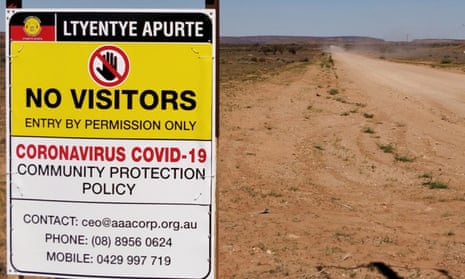The Northern Territory will “close the gate” from Tuesday, as the number of confirmed cases rises to five.
The NT’s strict border controls mean all access points – road, rail, air and sea – are closed, and anyone arriving from interstate will be required to quarantine for 14 days.
Details are still being worked out about exemptions, the process for applying, as well the how clearance will be managed at border crossings.
The NT government said this “unprecedented action” was to give its citizens as much confidence as possible that it was taking every step to keep them safe.
“The measures we are implementing are tough, but their purpose is clear: to save lives, and keep Territorians safe. That will always be our first priority,” Chief minister Michael Gunner said.
“We can’t build a wall, but we can put in gates. Saving lives and saving jobs are my only focus right now, everything else can get in the bin.”
Five people, all travellers from outside the NT, are now in isolation at Royal Darwin hospital: a man in his 30s returning from Europe, a 21-year old woman coming home from the US via Brisbane, a man in his 50s from New South Wales and two people who were on the Ruby Princess cruise liner, who flew to Darwin after docking in Sydney.
Under the commonwealth Biosecurity Act, all states and territories will nominate proscribed areas, in consultation with Indigenous communities, with travel heavily restricted and penalties enforced. People will have to undergo 14 days isolation before entry or re-entry is allowed.
There will be exemptions for medical care, food and other essential deliveries and critical services like mental health or domestic violence support, police and essential maintenance.
In the Northern Territory, 76 remote communities will come under the new measures.
“This adds a further layer of protection for our remote Indigenous communities,” Gunner said.
The NT’s Aboriginal medical services and land councils had asked for the entire territory and the remote tri-state border region – including communities in South Australia and Western Australia – to be declared a special control area.
“If this virus gets into our communities it will wipe out an entire generation of elders and many, many younger people as well,” John Paterson, the CEO of the Aboriginal Medical Services Alliance of the NT, said.
“The only way to prevent this from happening is to accept the reality that it is simply not possible to stop remote community residents from travelling between communities and regional centres and that here in the Territory we are all in this together.”
Queensland will seal its western border with the NT and is working on returning Aboriginal children to their home communities, many of whom are at boarding schools.
“We will do everything in our power subject to available aircraft to get children and, where it is not possible ... we’ll make sure we talk to the different schools to see what other measures we can put in place there,” the Queensland premier, Annastacia Palaszczuk, said.
Western Australia has tough new restrictions which apply to every remote Aboriginal community – from large population centres of more than 300 residents to very small communities with less than 10 residents. Fines of up to $50,000 will apply to those who breach the directions.
The federal government has also announced it will suspend group activities under remote work for the dole programs.
“Isolation and remoteness offer opportunities for delaying or potentially preventing an outbreak of Covid-19 in remote Indigenous communities.
“However, high mobility of community members and a reliance on visiting and outreach activities and services increase the risk of Covid-19 occurring in these communities,” the minister for Indigenous Australians, Ken Wyatt, said.
